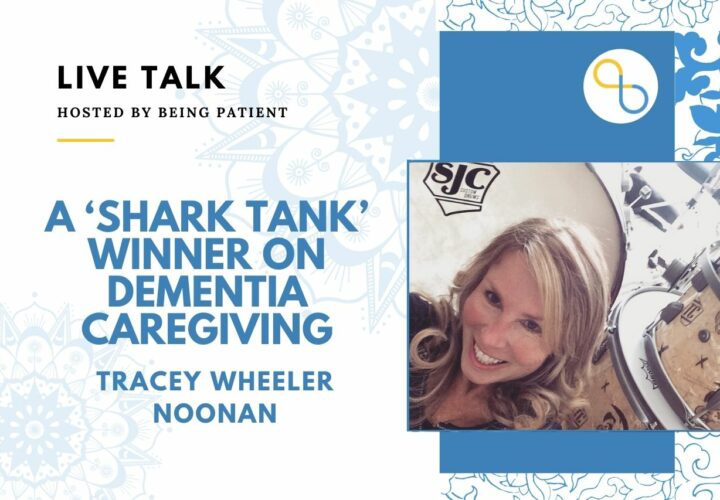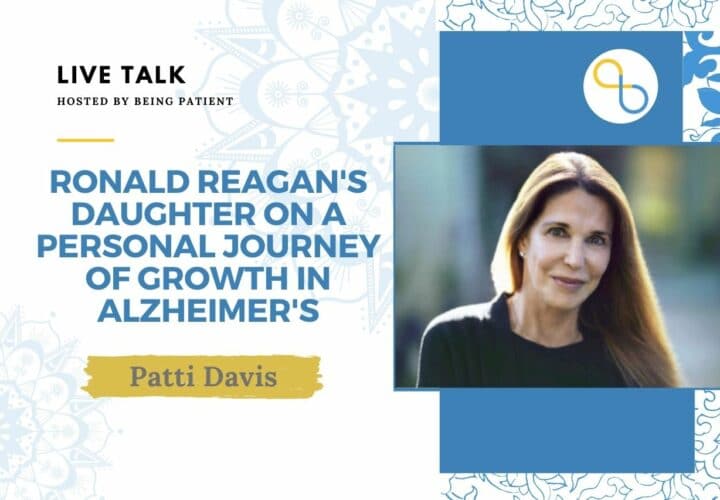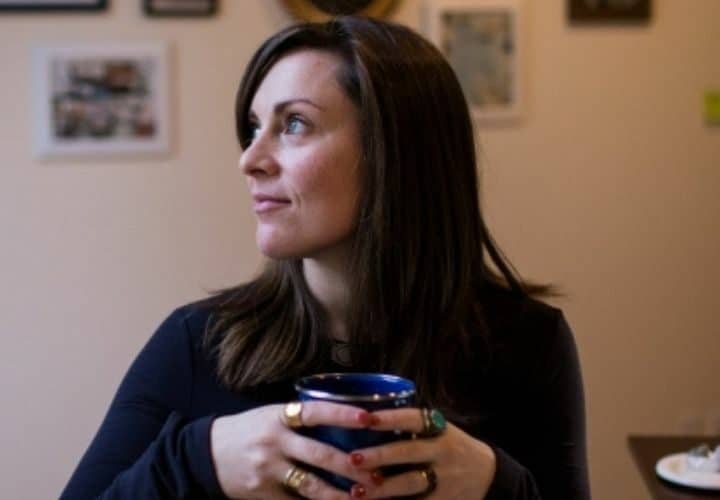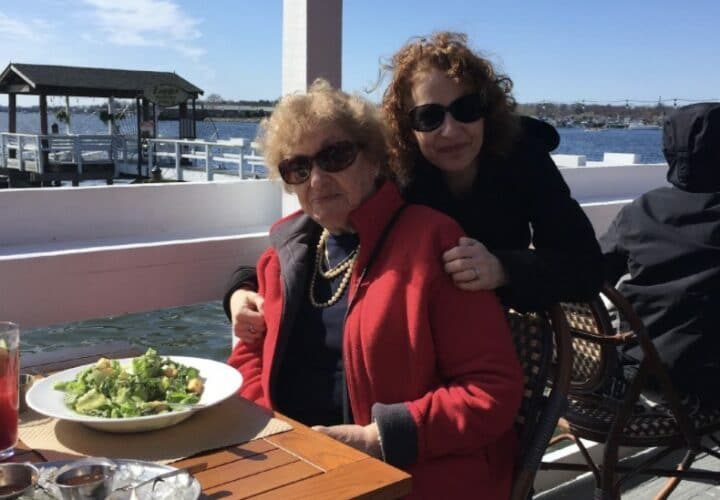Scriptwriter, cupcake entrepreneur and Shark Tank winner Tracey Wheeler Noonan reflects on the decline of her parents’ health due to Alzheimer’s.
In caregiving, we may get to know ourselves better, grow and evolve as people, and form new bonds or strengthen old ones. In times of sorrow or fatigue, however, recognizing the positives isn’t so easy. Tracey Wheeler Noonan, a writer and entrepreneur whose parents were diagnosed with Alzheimer’s in their mid-70s, reminds us that caregivers are not alone.
In Being Patient’s LiveTalk series, Noonan shares her experience caring for both her mother, Judith Ann Wheeler, and late father, Edward James Wheeler. Hoping to offer people a sense of companionship through the TV script What The Family!, Noonan discusses her inspiration for co-writing the script about her family’s journey with dementia.
She also discusses her gratitude for those who supported her as she navigated the challenges of being both a caregiver and the co-founder of the company Wicked Good Cupcakes (for which she was recognized on the TV show Shark Tank), along with advice on balancing work life with caregiving.
Being Patient: What inspired you to co-write What The Family!?
Tracey Noonan: I’ve co-written the television pilot with a very good friend of mine, writer and stand-up comedian Juston Mckinney. I approached Juston with this idea in 2017 after having cared for, in my home, both of my parents who were both diagnosed with Alzheimer’s disease.
One of the most important reasons that I wanted to write the story was because there are millions and millions of other people like myself who have been thrust into this role of caregiver … It can be a really lonely, lonely place.
By sharing my story, the story of my family [and] my parents, I thought that it would be a really good way to connect to these other people, offer entertainment in a very humorous, yet respectful way, and to be very genuine about portraying what this is actually like living with this disease.
Being Patient: Did you feel that, at times, it was a lonely path for you as well?
Tracey Noonan: Yeah. First, let me preface by saying I have an amazing family between my husband, my daughter, my sister-in-law Colleen [and] my brothers: all [of them are] wonderful and so helpful.
But when you’re actually living day-to-day with people suffering from this disease, you can kind of start to feel like all these emotions – this rollercoaster that you’re on – are strictly your own feelings. I think that’s where the loneliness comes in.
I can remember in particular a Fourth of July weekend. This was the point where my parents could not be left alone at all. My husband and I were home. It was a beautiful weekend, and all I wanted to do was go to the beach for two hours. I couldn’t because I had no one to watch my parents.
That feeling of not being able to live your life, and then [with the] subsequent frustration, anger, resentment, sorrow and feeling that your life is just not what you pictured, can really make you feel isolated and alone. I think a lot of people who are caregivers completely understand that feeling.
Being Patient: So, an inspiration for writing the TV script is to help others feel that they’re not alone.
Tracey Noonan: Absolutely. A really big lightbulb [moment] for me was when I went to my first caregiver support group meeting. It was such a blessing and I finally felt like I was within a group of people who got it, who understood what I was feeling.
Alzheimer’s is such a sad subject, and yet, we have so many moments that are really, really funny. My mom and dad would say and do things that were hilarious, and I would share them with my brothers or co-workers. People got to the point where they wanted to hear more of these stories.
If we didn’t accept the humor that was part of this journey, I think we’d all curl up in a ball and die, because it is so tragic. The way that Juston and I wrote this pilot and are developing the rest of the story is we inject a lot of humor. We didn’t want this to be doom and gloom. We didn’t want it to be depressing and sad. We wanted to offer people going through the same thing a bit of comic relief, but again, [in ways that are] done with a lot of reverence to the subject matter: so not laughing at someone as much as laughing with.
When I would go to these caregiver meetings and we’d all share stories, it was wonderful to see all the people around the room say, ‘Oh my God, my husband says that, my grandmother does that or my sister says that.’ There was this really cool, common bond that we all had because there [were] so many commonalities within the disease that we all shared.
Being Patient: Can you share a humorous anecdote from your caregiving experience?
Tracey Noonan: My dad sort of stopped recognizing my mother and thought there was a strange woman in his bed. This would panic him. He would come downstairs and he would say to us, ‘We have to talk … There’s a strange woman in my bed and your mother is going to be home soon.’ He did this three nights in a row.
The first night, he said to us, ‘Can I have a lawyer?’ My husband and I said, ‘No Ed, you can’t have a lawyer,’ and he just turned around and [went] back to bed.
The second night he came down and said, ‘There’s a strange woman in my bed. Can I have a gun?’ We’re like, ‘No Ed, you cannot have a gun.’
The third night he came down and said, ‘There’s a strange woman in my bed. Can I have some Viagra?’ We’re like, ‘Ed, no. You don’t need any Viagra. Go back to bed.’
Being Patient: Tell us about your experience at Shark Tank, along with the early days of your parents’ symptoms of Alzheimer’s?
Tracey Noonan: My daughter Dani and I aired on April 23, [2013]. We were in season four of Shark Tank, and overnight, we just blew up. We were really fortunate that Shark Tank was so good to us. I don’t know … what it was, but we received a lot of updates and airtime. Of course, television helped propel our business even further.
In 2014, we did our update on the opener for season five, and continued this hockey stick kind of growth. My husband and I were living in the North End of Boston. I remember I was walking down the street one day and I got a call from my youngest brother.
Being Patient: Was your dad in Israel with your mom?
Tracey Noonan: Oh no, she went with a [church group]. She had one day’s worth of change of clothes … She didn’t bring her medication. She had no idea where she was …
We take my mother from Israel directly to Boston, put her in a hospital in Boston [and] bring my dad up there … My brother and I go [to Florida] and [inspect] the house. It’s a disaster. Food is rotting in the fridge. Bills are piled sky high. Their neighbors are starting to come over and tell us that when my dad drives, he gets lost and has to call someone to come find him. We find out from the bank that my dad’s going there every day and taking large sums of money out of the bank, and no one knows where the money is. There’s stuff hidden all over the house. They had really no money left. [Later on], my daughter Dani and I [return to Florida to] clean out the house. We sell the house, and [my parents are] staying in Boston.
[With my dad], it is much more obvious that something’s wrong, so we make an appointment with a neurologist and find out that he has Alzheimer’s. We have him diagnosed. We think, ‘Okay, we’ll put them in assisted living.’ Mom still seems okay. We didn’t know that while she was in Israel, she didn’t know where she was. We still [didn’t] have any of that information.
Long story short, they’re in assisted living for four months and it’s a disaster. They can’t even turn on the television. My dad doesn’t know how to make a sandwich anymore. My brothers, sister-in-laws, my husband and I decide that Scott (Noonan’s husband) and I will buy a bigger house and move my parents in with us. In January 2015, that’s exactly what we did. We moved my parents in.
Being Patient: Then, your mother was diagnosed with Alzheimer’s in 2015. But to backtrack a little bit here, was it a difficult decision to move your parents to your home and care for them there?
Tracey Noonan: At the time, no, because I didn’t realize the … extent of what it would be like [with] not only the physical aspect of it, but [also] the emotional aspect of it.
I want to add that at this time, my father-in-law and mother-in-law were up in Stowe Vermont, and my father-in-law was dying. He had stage four cancer, so we moved them in with us as well. I had four adults in the house [with] varying degrees of disease or illness that we were managing and taking care of.
Being Patient: What was it like balancing between growing Wicked Good Cupcakes while caring for both of your parents?
Tracey Noonan: I had the most amazing group of co-workers on the face of the earth, starting with my husband who literally ran the show. My daughter was amazing. Melissa, Sandy, Becky (Noonan’s colleagues) – all the people who worked with us completely understood and gave me permission to come into work, vent, [and] to share stories.
Honestly, sometimes I would just go to the office and do what I needed to do for my parents just to be away. There [were] a lot of things [to deal with like] Social Security, assistance, insurance, prescriptions.
You spend hours on the phone, hours on hold, or hours trying to find who you need to talk to. Dealing with estate planning attorneys, becoming a medical proxy [and] financial proxy – it’s just unreal what you have to do and go through. By going into the office, I felt again connected with my co-workers and my business, and it was a blessing to have such great people who are so supportive and understanding of what we’re all going through.
Being Patient: Can you share some practical advice for caregivers who are also running a business like yourself?
Tracey Noonan: Number one is don’t be a hero. If someone offers you help, take it. Don’t feel like you have to be Superman or Superwoman. If people want to give you assistance, let them. Express your emotions, even if you have to hold a pillow up to your face and scream into it. Don’t let all of this consume you and grow inside you. Share what you’re feeling. Go to support groups.
There are things you can do for work. You may not be able to do everything you were doing. You can still be attached and be a part of it. But don’t beat yourself up. Do what you can do.
Being Patient: For example, people could delegate some of their own work to colleagues?
Tracey Noonan: Absolutely. You may not be in the best frame of mind to be [in] a conversation with a vendor or someone else. You may not be in that headspace you need to be [in], so let somebody else do it.
Being Patient: Do you have any last thoughts to add?
Tracey Noonan: For people who are in the process of this, do a lot of reading. Find organizations that appeal to you, like the Women’s Alzheimer’s Movement [and] 4MOM Foundation. Seth and Lauren Rogen are doing wonderful things with [HFC, formerly known as Hilarity for Charity].
Immerse yourself in this. Understand what’s happening. Read and get rest. Understand that you’re one person fighting a big battle. It’s a lot, but you can do this, and people want to help you.
The interview has been edited for length and clarity.
Contact Nicholas Chan at nicholas@beingpatient.com



